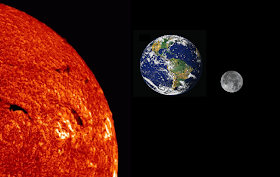

More than 350 years after the Roman Catholic Church condemned Galileo, Pope John Paul II is poised to rectify one of the Church's most infamous wrongs -- the persecution of the Italian astronomer and physicist for proving the Earth moves around the Sun. Photo
With a formal statement at the Pontifical Academy of Sciences on Saturday, Vatican officials said the Pope will formally close a 13-year investigation into the Church's condemnation of Galileo in 1633. The condemnation, which forced the astronomer and physicist to recant his discoveries, led to Galileo's house arrest for eight years before his death in 1642 at the age of 77.
The dispute between the Church and Galileo has long stood as one of history's great emblems of conflict between reason and dogma, science and faith. The Vatican's formal acknowledgement of an error, moreover, is a rarity in an institution built over centuries on the belief that the Church is the final arbiter in matters of faith.
At the time of his condemnation, Galileo had won fame and the patronage of leading Italian powers like the Medicis and Barberinis for discoveries he had made with the astronomical telescope he had built. But when his observations led him to proof of the Copernican theory of the solar system, in which the sun and not the earth is the center, and which the Church regarded as heresy, Galileo was summoned to Rome by the Inquisition. Forced to Recant
By the end of his trial, Galileo was forced to recant his own scientific findings as "abjured, cursed and detested," a renunciation that caused him great personal anguish but which saved him from being burned at the stake.
Since then, the Church has taken various steps to reverse its opposition to Galileo's conclusions. In 1757, Galileo's "Dialogue Concerning the Two Chief World Systems" was removed from the Index, a former list of publications banned by the Church. When the latest investigation, conducted by a panel of scientists, theologians and historians, made a preliminary report in 1984, it said that Galileo had been wrongfully condemned. More recently, Pope John Paul II himself has said that the scientist was "imprudently opposed."
"We today know that Galileo was right in adopting the Copernican astronomical theory," Paul Cardinal Poupard, the head of the current investigation, said in an interview published this week.
This theory had been presented in a book published in 1543 by the Polish scientist Nicolaus Copernicus in opposition to the prevailing theory, advanced by the second-century astronomer Ptolemy, that the Sun and the rest of the cosmos orbited the Earth. But the contest between the two models was purely on theoretic and theological grounds until Galileo made the first observations of the four largest moons of Jupiter, exploding the Ptolemaic notion that all heavenly bodies must orbit the Earth.
No comments:
Post a Comment